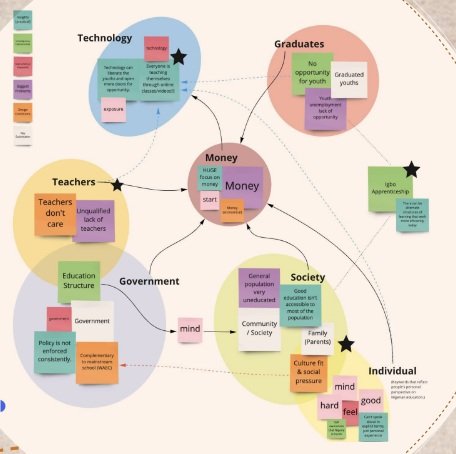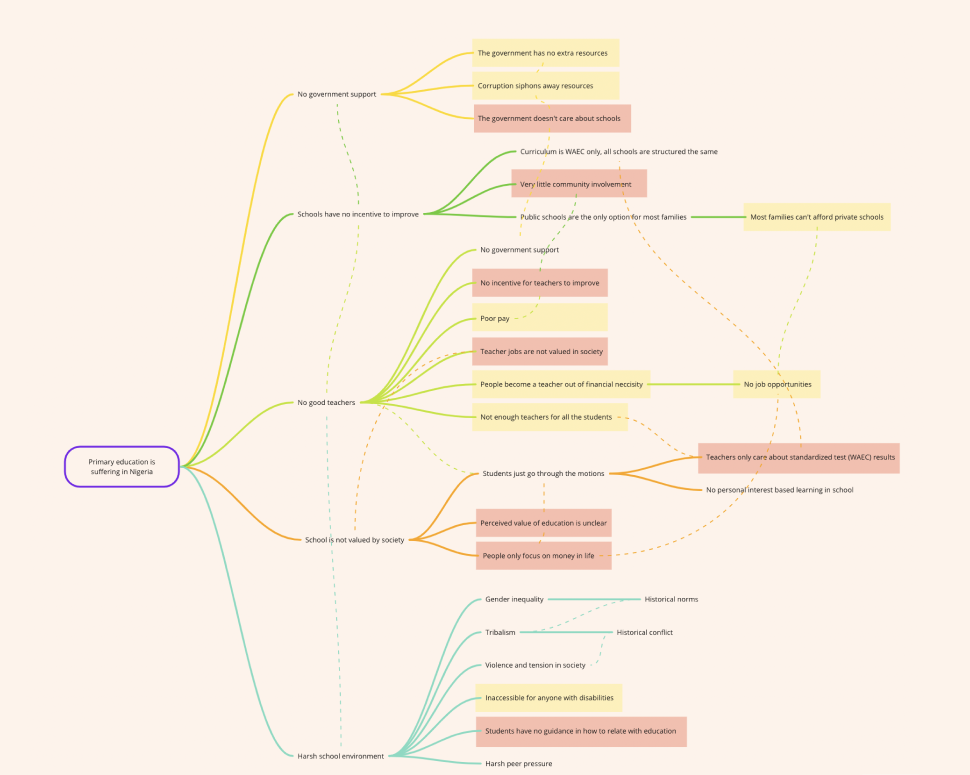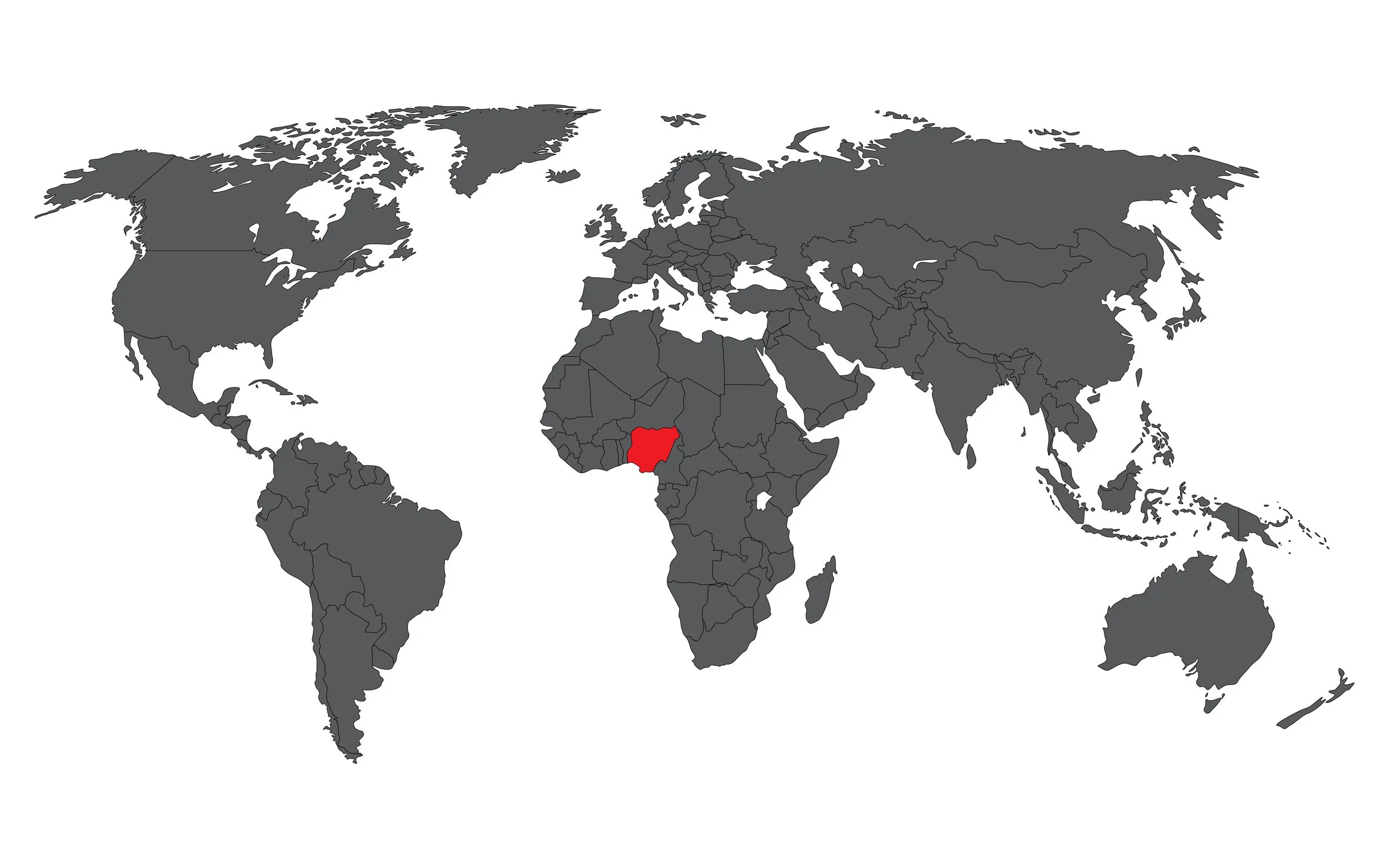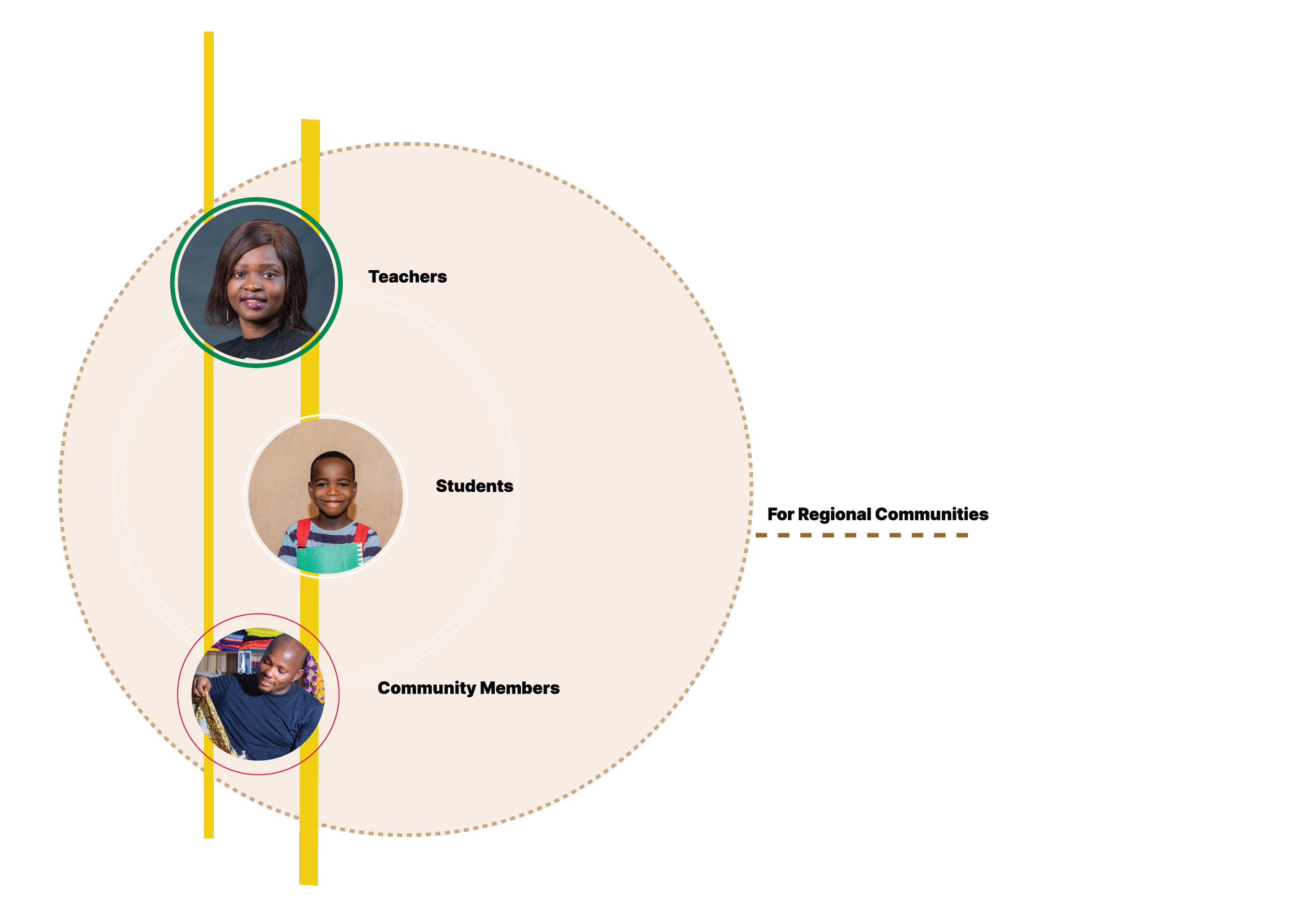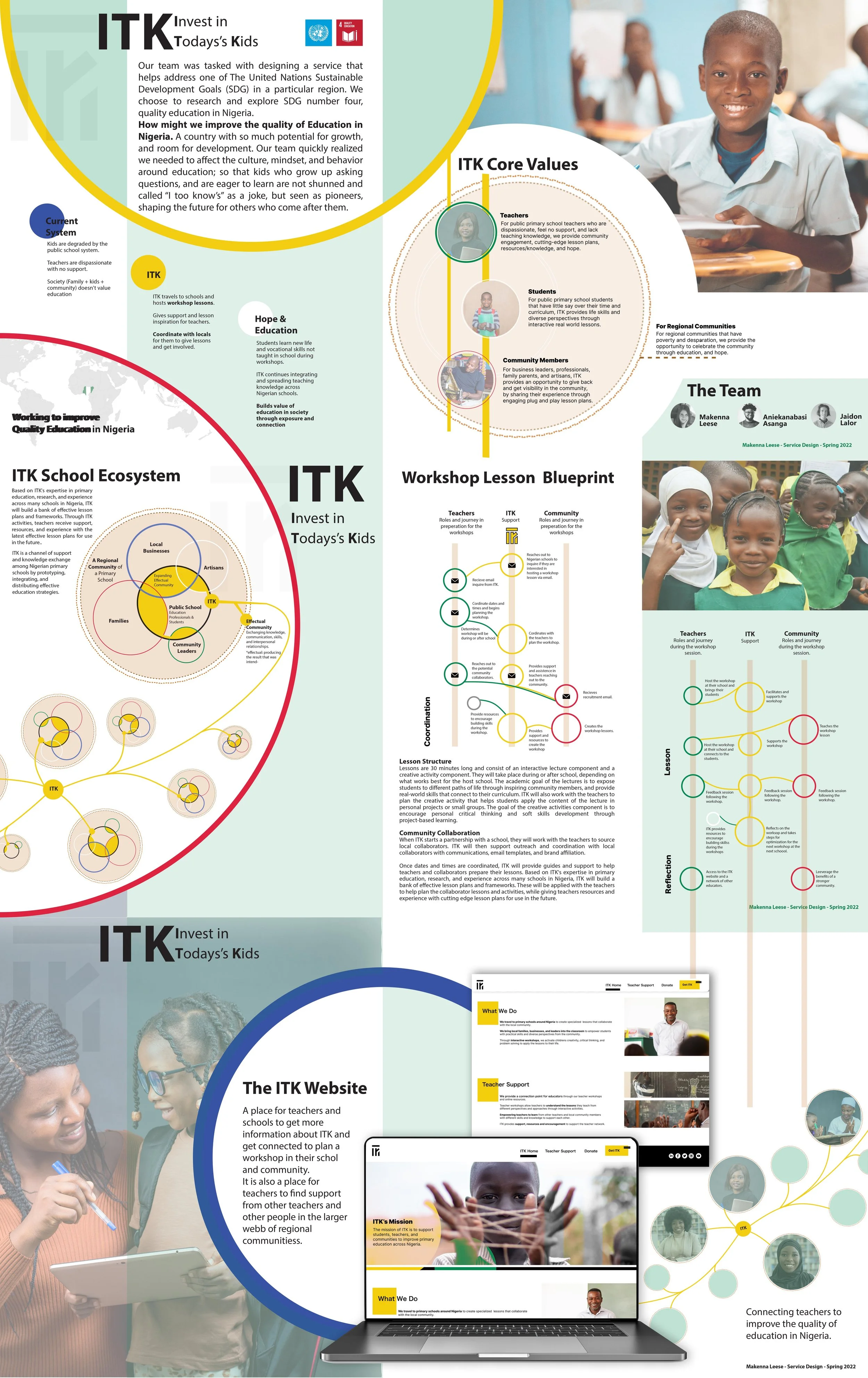
ITK: Investing in Today’s Kids
Project Duration 10 Weeks.
Methods used: Primary & secondary research, root cause analysis (5 whys technique), and co-creation sessions using semantic priming.
Tools used: MaxQDA, Figma, Miro.
Finding service solutions to help address quality education in Nigeria.
We chose to align our project with the mission and goals of UN Sustainable Development Goal number four: quality education, with a specific emphasis on Nigeria.
Our team was tasked with designing a service that helps address one of The United Nations Sustainable Development Goals (SDG) in a particular region. We choose to research and explore SDG number four, quality education in Nigeria.
How might we improve the quality of Education in Nigeria, a country with so much potential for growth and room for development? Our team quickly realized we needed to affect the culture, mindset, and behavior around education, enabling kids to grow up asking questions, eager to learn, are, not shunned and called “I too know’s” as a joke, but seen as pioneers, shaping the future for others who come after them.
Credit to the team of Aniekanabasi Asanga and Jaidon Lalor, with guidance from Professor Ricardo Martins
Context
It all begins with primary and secondary research.
Primary Research
Through our interviews and co-creation sessions, we gathered key insights into the context of the education system in Nigeria.
Many voiced how education is often just going through the motions. From going to school as a child because parents made them, to choosing classes and working hard from peer pressure, to even teachers going through the motions to only meet the testing expectations of the WAEC exams.
There are many forms of education not limited to what is taught in school. The knowledge taught at school is equally important to social, “human” skills that are often brushed over. Wisdom, problem-solving,
Money is a common motivator to continuing on with education to ensure a good future. A lack of money is a burden in education, specifically in public schools that are not funded and supported enough. Many Nigerians are stuck because they can’t afford to send their children to private schools, so they must send them to underfunded and supported public schools.
Those that have access to technology take advantage of it to learn more and pursue personal interests. Online courses, videos, and simple internet searches were all mentioned during the interviews.
Disparities in public schools affect the quality of education. Public schools are not funded well, and they do not have the incentive to improve.
There are many different perspectives on teachers. In many cases, teachers are overwhelmed and underqualified, especially in public schools. There are also cases where teachers and other people at the schools are the only ones truly supporting the child through their education.
State A Ecosystem
Understanding the current state and the stakeholders was fundamental.
Root Cause Analysis
A majority of resource scarcity in education is due to society’s lack of care and value for education investment.
No matter the quality of the education system, an individual and their communities support can determine students’ education experience and outcomes.
By addressing the cultural mindset around education, we can have the most profound systemic impact.
Red = issues related to resource scarcity
Yellow = issues related to education’s low priority status in society
Secondary Research
Throughout the process, we researched many factors that affect the education system.
The Igbo Apprenticeship System is a model is an old African tradition of the Igbo people to train youths in a specific trade and then help them start their own business. It impacts a largely equal community where there are opportunities for everyone. The biggest concern with this model is literacy and numeracy education are often abandoned.
The government resources for education are limited. Primary Schools are provided guidelines and a basic curriculum from the government, but they do not receive sufficient funding and support. Programs that have been created often fall through because of the lack of government support.
Core Objectives of education are substantial considerations to ensure students are learning practical and life skills. A consideration that is important is educating for understanding, not just memorization, often through discussions and collaborations. Another important core to quality education is teaching students how to take care of themselves physically and mentally. Part of that is learning core skills such as problem-solving, self-regulation, creative thinking, collaboration, and cultural and social skills.
State B Institution Map
Based on our initial research cycle, we discussed opportunities for systemic design intervention to have a big impact. Based on our ideas and discussions, we built a “State B” institution keyword pool.
The Current System
ITK Core Values and the Key Stakeholders
Teachers For public primary school teachers who are dispassionate, feel unsupported, and lack teacher training, ITK can provide community engagement, cutting-edge lesson plans, resources and knowledge, and hope.
Students For public primary school students that have little say over their time and what they have access to learn, ITK provides life skills and diverse perspectives through interactive real-world lessons in workshop settings.
Community members For business leaders, professionals, family, and artisans, ITK provides an opportunity to give back and get visibility in the community by sharing their experiences and knowledge through engaging lessons at their local primary school, with assistance and templates from ITK.
Regional Communities For regional communities that are impoverished, ITK provides the opportunity to celebrate the local community (communities) through education and the local primary schools.
Proposed Solution
The ITK Workshops
Lesson Structure
Lessons are 30 minutes long and consist of an interactive lecture component and a creative activity component. They will take place during or after school, depending on what works best for the host school. The academic goal of the lectures is to expose students to different paths of life by inspiring community members and providing real-world skills that connect to their curriculum. ITK will also work with the teachers to plan the creative activity that helps students apply the content of the lecture in personal projects or small groups. The goal of the creative activities component is to encourage personal critical thinking and soft skills development through project-based learning.
Preparation for the workshop
During the workshop
The ITK Website: Teacher Resources & Community
A place for teachers and schools to get more information about ITK and get connected to plan a workshop in their school and community. It is also a place for teachers to find support from other teachers and other people in a more extensive of regional communities.
Community Collaboration
When ITK starts a partnership with a school, it will work with the teachers to source local collaborators. ITK will then support outreach and coordination with local collaborators with communications, email templates, and brand affiliation. Once dates and times are coordinated, ITK will provide guides and support to help teachers and collaborators prepare their lessons. Based on ITK's expertise in primary education, research, and experience across many schools in Nigeria, ITK will build a bank of effective lesson plans and frameworks. These will be applied with the teachers to help plan the collaborator lessons and activities while giving teachers resources and experience with cutting-edge lesson plans for use in the future.
Final Poster

Key Takeaways
This project has significantly enhanced my understanding of systems and the process of creating ecosystem maps.
Throughout the project, I gained valuable experience in effectively communicating with a team of collaborators as well as diverse stakeholders and subject matter experts.
Additionally, I developed proficiency in employing techniques like root cause analysis to delve into underlying issues and motivations more comprehensively.
